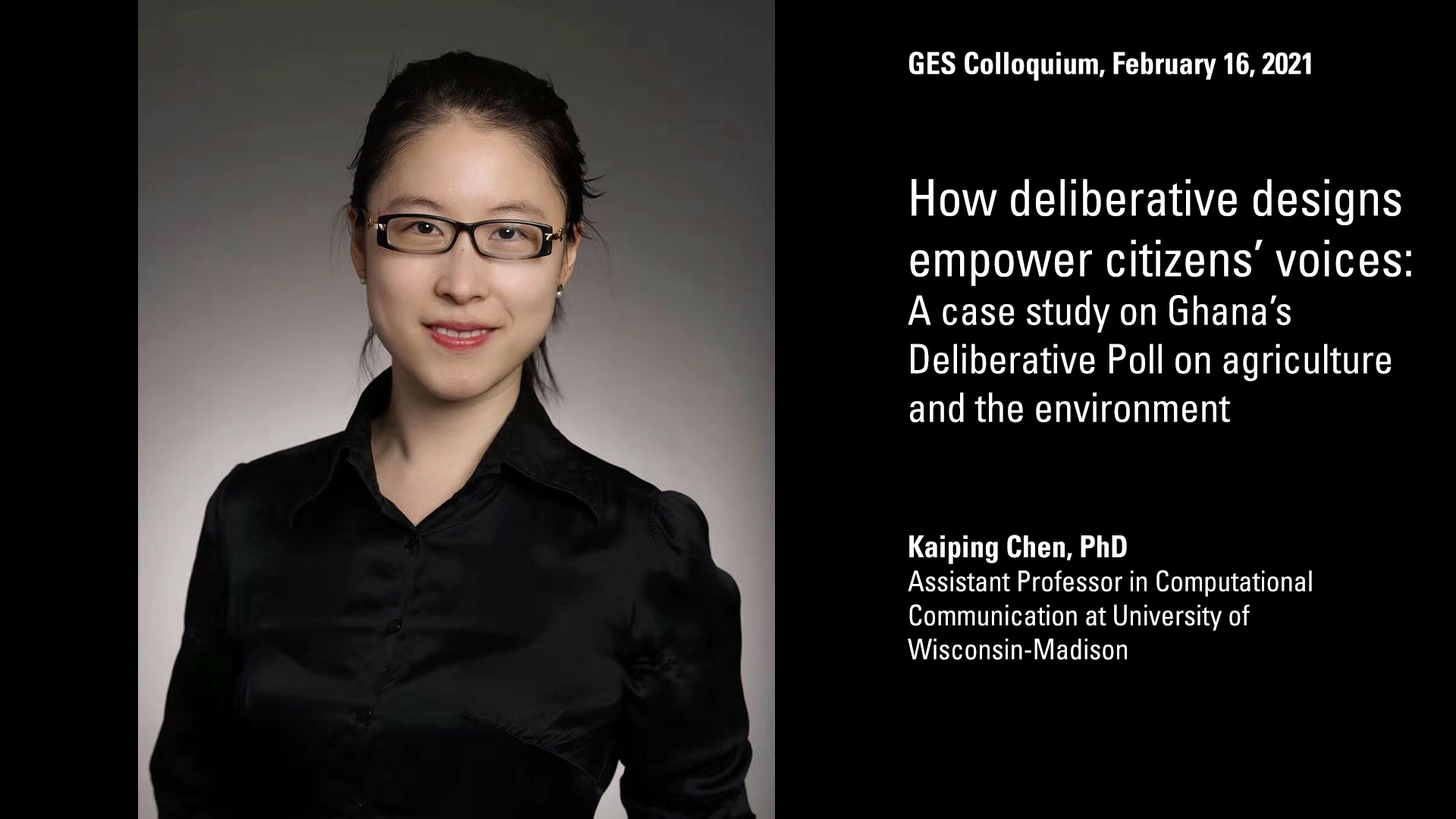
- This event has passed.
Kaiping Chen – How deliberative designs empower citizens’ voices: A case study on Ghana’s Deliberative Poll on agriculture and the environment | GES Colloquium (Zoom)

GES Colloquium Home | Zoom Registration | GES MediaSite | Video Archives | Podcast | @GESCenterNCSU | Newsletter
How deliberative designs empower citizens’ voices: A case study on Ghana’s Deliberative Poll on agriculture and the environment
Speaker: Kaiping Chen, PhD, Assistant Professor in Computational Communication at University of Wisconsin-Madison
Website | Twitter @Kaiping_Chen
Public deliberation designs for engaging and empowering the views of diverse publics in addressing complex policy issues
Abstract
Empowering ordinary citizens with the capacity to deliberate is a core issue in science communication. Despite growing deliberative practices in developed nations, it is significantly less understood how public deliberation can happen among populations who live with limited educational resources and poor urban infrastructure in developing countries. This article studied a case of a well-designed deliberation method, Deliberative Poll, in Tamale, Ghana. I analyzed the stimulus information video and thousands of speech acts from deliberation transcripts to examine how expertise was used and what was deliberated in public dialogue. A broad range of expertise and interests were represented. Participants had thoughtful discussions on complex policy issues and their discussion results were considered by local policymakers. This article contributes to our understanding of how to effectively foster public deliberation among populations in the Global South and measure the nuances of expertise and public reasoning on science.
Related:
- Kaiping Chen (2020) How deliberative designs empower citizens’ voices: A case study on Ghana’s deliberative poll on agriculture and the environment. Public Understanding of Science. October 2020. doi:10.1177/0963662520966742
Speaker Bio
Dr. Kaiping Chen (@Kaiping_Chen) is an assistant professor in computational communication in the Department of Life Sciences Communication at the University of Wisconsin-Madison and an affiliate of the UW-Madison Robert & Jean Holtz Center for Science and Technology Studies and the Center for East Asian Studies. Chen’s research employs data science to examine how digital media and technologies affect political accountability to public well-being and how deliberative designs can improve public discourse on controversial and emerging technologies. Chen’s research has been funded by the National Science Foundation. Her works have been published in peer-reviewed journals across disciplines including American Political Science Review, Public Understanding of Science, Journal of Science Communication, International Public Management Journal, Politics, Frontiers In Sustainable Cities, and The Russell Sage Foundation Journal of the Social Sciences, among others.
WordPress database error: [Unknown column 'wp_tec_occurrences.start_date' in 'SELECT']SELECT SQL_CALC_FOUND_ROWS wp_posts.*, CAST( wp_tec_occurrences.start_date AS DATETIME ) AS event_date
FROM wp_posts LEFT JOIN wp_term_relationships ON (wp_posts.ID = wp_term_relationships.object_id) LEFT JOIN wp_postmeta ON ( wp_posts.ID = wp_postmeta.post_id AND wp_postmeta.meta_key = '_EventHideFromUpcoming' ) LEFT JOIN wp_postmeta AS mt1 ON ( wp_posts.ID = mt1.post_id )
WHERE 1=1 AND wp_posts.ID NOT IN (15854) AND (
wp_term_relationships.term_taxonomy_id IN (149,521,802)
OR
wp_term_relationships.term_taxonomy_id IN (45,47)
) AND (
wp_postmeta.post_id IS NULL
AND
( mt1.meta_key = '_EventStartDate' AND CAST(mt1.meta_value AS DATETIME) >= '2026-02-26 21:17:17' )
) AND wp_posts.post_type IN ('post', 'page', 'attachment', 'tribe_venue', 'tribe_events', 'tribe_event_series') AND ((wp_posts.post_status = 'publish'))
GROUP BY wp_tec_occurrences.occurrence_id
ORDER BY event_date ASC, wp_posts.post_date ASC
LIMIT 0, 3